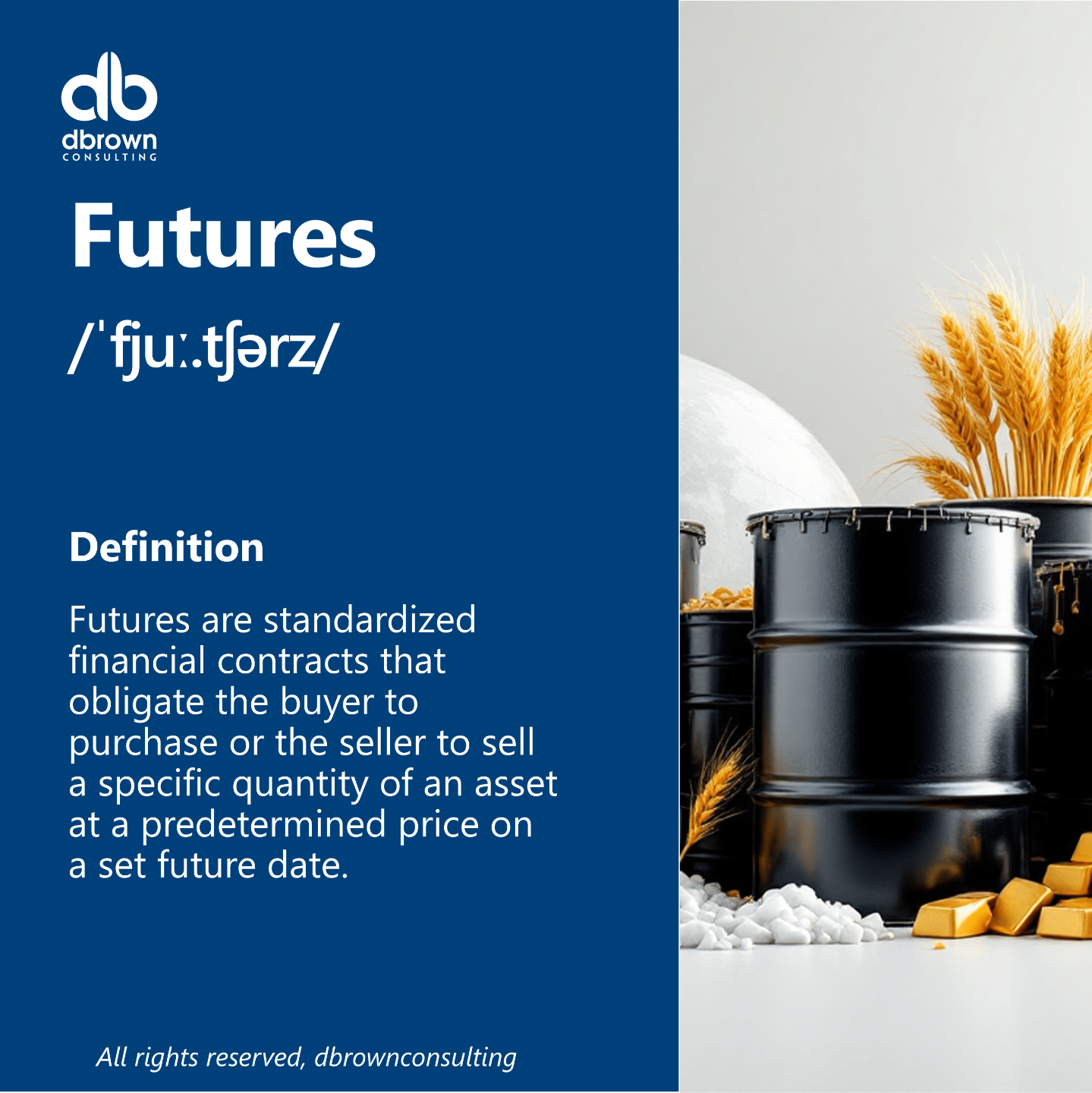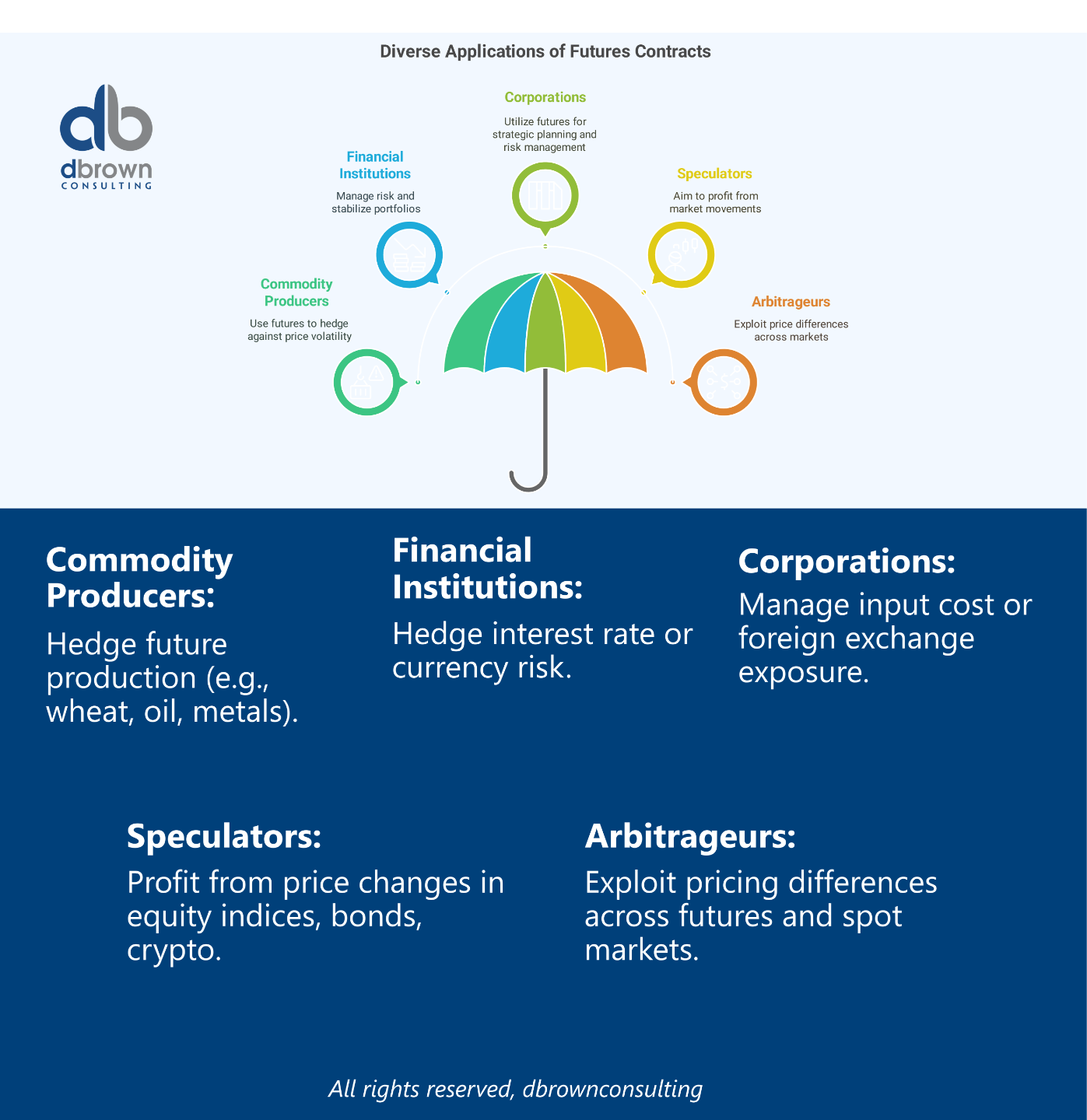FUTURES
Definition
Futures are standardized financial contracts that obligate the buyer to purchase or the seller to sell a specific quantity of an asset at a predetermined price on a set future date. They are traded on organized futures exchanges and used for hedging or speculation.
A futures contract locks in the price today for a transaction that will occur at a specific date in the future.
Origins
Futures trace back to 17th-century Japan with rice markets and became institutionalized in 19th-century Chicago, where agricultural commodity contracts led to the establishment of the Chicago Board of Trade (CBOT). Today, futures span commodities, financial instruments, and digital assets, managed by entities like CME Group and ICE.

Usage
Industry Applications:
-
Commodity Producers – Hedge future production (e.g., wheat, oil, metals).
-
Financial Institutions – Hedge interest rate or currency risk.
-
Corporates – Manage input cost or foreign exchange exposure.
-
Speculators – Profit from price changes in equity indices, bonds, crypto.
-
Arbitrageurs – Exploit pricing differences across futures and spot markets.
How Futures works
Basic Structure:
-
Parties: Buyer (long) and Seller (short)
-
Underlying Asset: Commodity, stock index, interest rate, currency, etc.
-
Standardized Terms:
-
Quantity
-
Quality (if applicable)
-
Expiration Date
-
Settlement Type (cash vs. physical)
-
Lifecycle:
-
Contract is entered via exchange.
-
Initial margin is posted (good faith deposit).
-
Daily mark-to-market gains/losses adjusted via variation margin.
-
At expiration, contract is either settled in cash or physically delivered.
Key Takeaways
-
Futures are standardized and exchange-traded, unlike forward contracts.
-
Require margin accounts and are subject to daily settlement.
-
Used for both hedging real exposure and speculative trading.
-
Can be cash-settled (e.g., S&P 500 futures) or physically settled (e.g., oil, gold).
-
Highly liquid and leveraged instruments with robust regulatory oversight.

Types of Futures
| Category | Examples |
|---|---|
| Commodity Futures | Crude oil (CL), gold (GC), corn (ZC) |
| Equity Index Futures | S&P 500 (ES), NASDAQ (NQ), FTSE 100 |
| Interest Rate Futures | U.S. Treasuries (ZB, ZN), Eurodollar |
| Currency Futures | EUR/USD (6E), JPY/USD, GBP/USD |
| Volatility Futures | VIX Index Futures |
| Crypto Futures | Bitcoin (BTC), Ether (ETH) – traded on CME, Binance, etc. |
Futures& Financial Modeling
Futures impact:
-
Hedging Models – Lock input costs (e.g., airlines hedge fuel).
-
Earnings Forecasts – Use locked-in prices to reduce volatility.
-
Risk Management – Calculate Value at Risk (VaR) including derivative exposure.
-
Fair Value Pricing – Model expected future spot price and cost of carry.
-
Cash Flow Modeling – Reflect margin calls and settlements.
Nuances & Complexities
-
Leverage: Small margin deposit controls large notional exposure.
-
Liquidity & Slippage: Heavily traded futures (e.g., ES, CL) have tight spreads.
-
Contango vs. Backwardation:
-
Contango: Futures price > spot (common in oil, storage-heavy assets).
-
Backwardation: Futures price < spot (often in high-demand periods).
-
-
Rolling Contracts: Traders avoid delivery by rolling positions to next contract.
-
Regulations: Governed by CFTC (U.S.), ESMA (EU), with exchange-level risk controls.
Mathematical Formulas
1. Futures Price (Cost of Carry Model):
Where:
-
= Futures price
-
= Spot price
-
= Risk-free rate
-
= Convenience yield or dividend
-
= Time to maturity
2. Profit/Loss from Futures Trade:
3. Mark-to-Market Margin:
Master Financial Modeling with the FMA
Change your career today by earning a Globally Recognized Accreditation
Develop real-world financial modeling skills, gain industry-recognized expertise, stand out and start earning more by gaining the Advanced Financial Modeler (AFM) designation from the Financial Modeling Institute.
Our expert-led online cohort based program covers everything you need to become a world class financial modeling pro and advance your career in finance.
Related Terms
-
Forward Contract
-
Hedging
-
Derivatives
-
Options
-
Leverage
-
Contango
-
Margin Call
-
Basis Risk
References & Sources
Unlock the Language of Finance!
Elevate your financial acumen with DBrown Consulting’s exclusive newsletter. We break down complex finance terms into clear, actionable insights—empowering you to make smarter decisions in today’s markets.
Subscribe Today & Make Financial Jargon Simple!
We won't send spam. Unsubscribe at any time.

